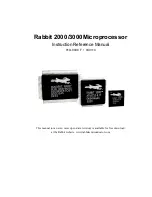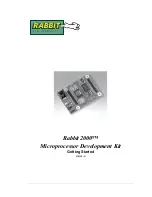
Rabbit 6000 User’s Manual
digi.com
161
16. T
IMER
A
16.1 Overview
The Timer A peripheral consists of 12 separate eight-bit countdown timers, A1–A12. Each counter counts
down from a programmed time constant, which is automatically reloaded into the respective counter when
the count reaches zero. For example, if the reload register contains 127, then 128 pulses enter on the left
before a pulse exits on the right (see Figure 16.1). If the reload register contains zero, then each pulse on
the left results in a pulse on the right, that is, there is division by one. The reload register can contain any
number in the range from 0 to 255. The counter divides by (
n
+ 1).
Figure 16.1 Reload Register Operation
The output pulses are always one clock wide. Clocking of the timers takes place on the negative edge of
these pulses. When the counter reaches zero, the reload register is loaded into the counter on the next input
pulse instead of a count being performed. The terminal count condition for Timers A1–A7 is reported in a
status register and can be programmed to generate an interrupt. Six of these seven timers (A2–A7) have
the option of being cascaded from Timer A1, but the primary clock for all of the timers is the peripheral
clock either directly or divided by TAPR (the default = 2).
Timers A2–A7 can be used to generate baud rates for Serial Ports A–F, or they can be used as general-pur-
pose timers if the dedicated baud rate timers on the Rabbit 6000 serial ports are used. Timers A8, A9, A10,
and A11 serve as prescalers which determine the resolution of the input capture, PWM, quadrature
decoder, and Timers B/C peripherals respectively. The peripherals clocked by these timers can generate
Summary of Contents for 6000
Page 1: ...Rabbit 6000 Microprocessor User s Manual 90001108_J...
Page 11: ...Rabbit 6000 User s Manual digi com 11 1 3 Block Diagram Figure 1 1 Rabbit 6000 Block Diagram...
Page 43: ...Rabbit 6000 User s Manual digi com 43 4 1 1 Block Diagram...
Page 57: ...Rabbit 6000 User s Manual digi com 57 5 1 1 Block Diagram...
Page 88: ...Rabbit 6000 User s Manual digi com 88 7 2 Block Diagram...
Page 115: ...Rabbit 6000 User s Manual digi com 115 11 1 1 Block Diagram...
Page 127: ...Rabbit 6000 User s Manual digi com 127 12 1 1 Block Diagram...
Page 138: ...Rabbit 6000 User s Manual digi com 138 13 1 1 Block Diagram...
Page 154: ...Rabbit 6000 User s Manual digi com 154 15 1 1 Block Diagram...
Page 163: ...Rabbit 6000 User s Manual digi com 163 16 1 1 Block Diagram...
Page 170: ...Rabbit 6000 User s Manual digi com 170 17 1 1 Block Diagram...
Page 177: ...Rabbit 6000 User s Manual digi com 177 18 1 1 Block Diagram...
Page 186: ...Rabbit 6000 User s Manual digi com 186 19 1 1 Block Diagram...
Page 230: ...Rabbit 6000 User s Manual digi com 230 22 2 Block Diagram...
Page 234: ...Rabbit 6000 User s Manual digi com 234 Figure 22 3 Sample Slow A D Converter Circuit...
Page 287: ...Rabbit 6000 User s Manual digi com 287 25 1 1 Block Diagram...
Page 310: ...Rabbit 6000 User s Manual digi com 310 26 1 1 Block Diagram...
Page 323: ...Rabbit 6000 User s Manual digi com 323 28 1 1 Block Diagram...
Page 351: ...Rabbit 6000 User s Manual digi com 351 31 1 4 Block Diagram...
Page 361: ...Rabbit 6000 User s Manual digi com 361 32 1 1 Block Diagram...
Page 369: ...Rabbit 6000 User s Manual digi com 369 33 2 Block Diagram...
Page 390: ...Rabbit 6000 User s Manual digi com 390 35 1 1 Block Diagram...
Page 408: ...Rabbit 6000 User s Manual digi com 408...
Page 410: ...Rabbit 6000 User s Manual digi com 410...
Page 411: ...Rabbit 6000 User s Manual digi com 411...
Page 420: ...Rabbit 6000 User s Manual digi com 420 Figure 37 1 Memory Read and Write Cycles...
















































